
|
|
Issue Number 19 • Tuesday, June 26, 2018 |
Campus ChampionJennifer Wilson, associate director of communications, has been writing SUNY Cortland’s stories for more than 20 years. Jennifer has served on numerous committees and coached many writing interns, giving selflessly of her time, talent and energy to advance SUNY Cortland’s mission. Her dedication to higher education institutional advancement is far-reaching. She raised support for annual conferences of the State University of New York Council for University Affairs and Development (SUNYCUAD) by serving as sponsor liaison for five consecutive conferences. In recognition, SUNYCUAD inducted Jennifer into its Hall of Fame Class of 2018 on June 7. Wednesday, July 4Independence Day Thursday, July 12 to Sunday, July 15Friday, July 13Red and White Golf Classic: Captain and Crew 18-hole tournament. Proceeds will support Cortland Athletics and the SUNY Cortland Alumni Association. Cortland Country Club, 9:30 a.m. Thursday, Aug. 23President’s Opening Address and Faculty Meetings: Corey Union Function Room, 8 a.m. Sunday, Aug. 26Academic Convocation: Park Center Alumni Arena, 4 p.m. Monday, Aug. 27 |
SUNY Cortland Receives Record Number of Applications06/25/2018SUNY Cortland received more student admission applications this spring than at any time during its 150-year history, and this fall will welcome one of its largest incoming classes ever. A record 13,285 prospective students applied for Fall 2018 enrollment as SUNY Cortland freshmen, leading the College to stop accepting applications in April. This fall, 1,271 first-year students will attend the College. That would have been the largest freshman class in three decades if it hadn’t been for last year, when 1,345 enrolled. “Students want to come to SUNY Cortland,” President Erik J. Bitterbaum said. “We’re very fortunate to be able to offer a combination of high-value, affordable academic programs, top-notch faculty and facilities and an active and welcoming campus.” This year’s enrollment success isn’t a blip. SUNY Cortland’s enrollment has grown steadily over the last decade, and has remained strong despite a number of statewide and national challenges that have hurt attendance at many other four-year liberal arts colleges. There’s no one reason for students’ strong, continued interest in SUNY Cortland, according to Bitterbaum. He cites several:
For more information on SUNY Cortland — or to apply, take a virtual tour or schedule a visit — visit Cortland.edu. Reunion 2018 Kicks Off Sesquicentennial06/22/2018This year is the 150th anniversary of SUNY Cortland, and the SUNY Cortland Alumni Association plans to mark this milestone in a big way during Alumni Reunion 2018. Hundreds of returning alumni and friends will celebrate the SUNY Cortland Sesquicentennial as they enjoy class get-togethers, parties and other activities both on and off campus from Thursday, July 12, through Sunday, July 15. Highlighting the beginning of the College’s sesquicentennial year, Robert Channing, a world-famous mentalist and speed painter who was a hit on “America’s Got Talent,” will perform on Saturday, July 14, at the Lynne Parks ’68 SUNY Cortland Alumni House during the “Brews and Barbecue” event. What Channing plans to paint during the evening is a mystery that is sure to entertain attendees. “We are ready to kick off the College’s Sesquicentennial at Reunion,” said Erin Boylan, executive director of alumni engagement at SUNY Cortland and co-chair of the College’s Sesquicentennial Committee. 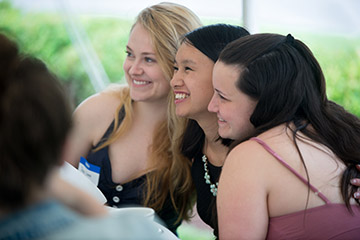
“We can’t wait to celebrate our 150 years of excellence with our alumni by offering enhanced programming,” she said. “Reunion is always a wonderful time because of the people, and we look forward to having our amazing graduates back on campus yet again.” As always, all alumni are welcome at Reunion, regardless of class year. Featured groups include the Half Century Club, comprised of alumni who graduated more than 50 years ago; the Classes of 1953, 1958, 1963, 1968, 1973 and 1993; sisters of Nu Sigma Chi sorority, brothers of Beta Phi Epsilon (1927-1995) fraternity, men’s basketball and women’s basketball. The Classes of 1977, 1978 and 1979 will return as the 40th Cluster Reunion. Reunion opens Thursday with the Class of 1968 50th Reunion Dinner, which will take place in the back gardens of the Lynne Parks ’68 SUNY Cortland Alumni House. On Friday, the alumni association and Athletics Department will combine talents to continue the “Red and White Golf Classic.” The enhanced golf tournament will be held at the Cortland Country Club and will serve as a fundraiser for both organizations. Later that morning, the Class of 1968 will depart for the Seneca Lake Wine Tour while Nu Sigma Chi will host a campus-wide sorority scavenger hunt. That afternoon, the Cortland College Foundation and SUNY Cortland President Erik J. Bitterbaum will host a special reception at the Parks Alumni House to welcome all Red Dragons and to thank the Reunion Committee members. Later that night, the Beta Phi Epsilon (1927-1995) fraternity will have their Welcoming Social in the Corey Union Function Room. Nu Sigma Chi sorority will celebrate its 90th anniversary with a dinner in the beautiful gardens at the Parks Alumni House. The Half Century Club will again enjoy dinner in Brockway Hall Jacobus Lounge, and a musical, “Newsies,” at Cortland Repertory Theatre. 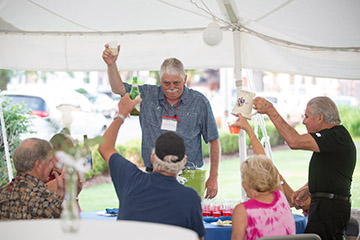
Saturday’s events include classes offered by graduates as well as guided tours of the campus and the Parks Alumni House. The SUNY Cortland Alumni Association will present its highest honor, the Distinguished Alumni Award, to three graduates during the Alumni Reunion 2018 luncheon. The luncheon begins Saturday at noon in the Corey Union Function Room and honors reunion classes and the award recipients. The following 2018 Distinguished Alumni will be honored:
The association also will present a number of other major honors that afternoon, including the inaugural Distinguished Educator Award. The 2018 Distinguished Educator Award recipients are:
The 2018 Distinguished Young Alumnus Award recipients are:
The 2018 Outstanding Alumni Volunteer Award recipient is:
The association’s newest Honorary Alumna is:
Following the luncheon, the Nu Sigma Chi Legacy Fund will underwrite the All-Greek Reception at the Parks Alumni House. The Lofty Elm Society Information Session and Reception will be hosted by Bitterbaum in the Dowd Fine Arts Gallery. Saturday evening, all reunion attendees are invited to the Parks Alumni House for “Brews and Barbecue.” In addition to the Robert Channing performance, the event will offer a selection of barbecue fare and a photo booth featuring decades props. Joe McInerney ’70, a member of the association’s Concert Era Committee, will guest DJ at the event to raise awareness about the committee’s desire to highlight artists that have performed on campus and the plans to build a sculpture commemorating the many big-name concerts held on campus. Prizes will be given to those able to guess artists who have performed at SUNY Cortland. A series of Young Alumni Reunion Day (Y.A.R.D.) events — geared for graduates from the past 10 years — are scheduled for that day. Activities will include brunch with Bitterbaum, complimentary beverages at the Cortland Beer Company and Finger Lakes Tasting Room, an invitation to join all classes for “Brews and Barbecue,” and “Ignite the Night” to close the evening at the Red Jug Pub. On Sunday, a farewell breakfast for all classes is scheduled for 9 to 10:30 a.m. at the Parks Alumni House Kappa (1925-1991) Alumni Lawn. The campus community is encouraged to attend Alumni Reunion 2018. For more information or to register, contact Alumni Engagement at 607-753-2516 or visit RedDragonNetwork.org/reunion. Capture the MomentThe fifth annual William Shaut Memorial Color Fun Run on June 24 drew 83 participants, including members of the Shaut family. Shaut, who died in 2014, was SUNY Cortland’s vice president for finance and management and a dedicated supporter of SUNY Cortland’s Child Care Center. The event raised nearly $2,000 for the center. Promising “more fun than run,” children and adults were splashed with colorful powder at each of three color stations along the route. See more photos. In Other NewsAnnual Leadership Conference Helps Develop CNY EducatorsEducation leaders from throughout Central New York will gather at SUNY Cortland Friday, July 13 to learn about encouraging innovation and creativity in schools from internationally recognized author and speaker George Couros. Couros, the author of The Innovator’s Mindset: Empower Learning, Unleash Talent, and Lead a Culture of Creativity, will speak to school and district administrators from throughout Central New York at SUNY Cortland during the annual Francis J. Cheney Educational Leadership Institute. The institute, held in Park Centers Alumni Arena, takes place just as Alumni Reunion 2018 weekend kicks off with the SUNY Cortland Sesquicentennial, marking the College’s 150thyear as a leader in teacher education. 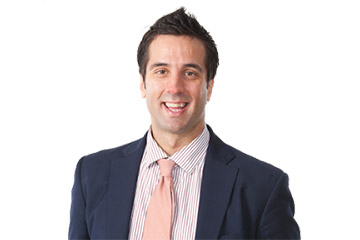
“Couros challenges school leaders to make student learning the center of all their activity and to approach students and schools with his ‘innovator’s mindset,” said organizer Christopher Manaseri, assistant professor in the College’s Foundations and Social Advocacy Department, which is housed within the School of Education. Couros, a speaker and leader in the area of innovative leadership, teaching and learning, will share his ideas with this group as it discusses how to prepare tomorrow’s leaders to transform the quality of their schools. They will be joined by some 16 SUNY Cortland student interns aiming to become the educational leaders of the future. “The Cheney Institute serves as an opportunity for students in the educational leadership program to connect and interact with practitioners in the field around current topics,” Manaseri said. The annual event is coordinated by faculty in the College’s Educational Leadership Program in partnership with local Board of Cooperative Educational Services (BOCES) agencies. The institute program, “A Day with George Couros, Author of The Innovator’s Mindset,” will take place from 8:30 a.m. until 3:30 p.m. in Park Center Alumni Arena. The institute is geared for all current school administrators and teachers who aspire to become administrators. They are invited to register by the Tuesday, July 3 deadline through the Institute’s website. Mansari anticipates 100 to 150 area school leaders will attend. The summer institute is also intended for students enrolled in SUNY Cortland’s Educational Leadership Department. The July 13 conference marks its 10th year as an annual event, named after Francis J. Cheney, who served as Cortland Normal School principal from 1891 until his death in 1912. Lunch and a copy of Couros’ book are included in the $15 registration fee, which may be waived by the Onondaga-Cortland-Madison BOCES. The institute will aim to help attendees in the following areas:
Attendance at the institute is required of educational leadership interns, who have the chance to interact with established school leaders and participate in solving authentic leadership challenges during and after the Institute, as local schools accept the charge to make change in their practices to improve student outcomes. As a K-12 teacher and technology facilitator, school and district administrator, Couros has worked with all levels of school. He is a sought-after speaker on the topic of innovative student learning and engagement and has worked with schools and organizations around the globe. He will also give the keynote address at the School Administrators Association of NYS (SAANYS) annual conference in October at Lake Placid, N.Y. “Couros is a practicing school leader, blogger and consultant on school change and improvement who has addressed major school improvement and governance groups across the country in recent years,” said Manaseri, himself a retired school district superintendent. He created ConnectedPrincipals.com, an initiative that brings educators and leaders together from around the world to create powerful learning opportunities for students. His work is featured at his blog. “My focus is always the development of leadership and people and what is best for learners,” Couros said. “My belief is that meaningful change happens when you first connect to people’s hearts.” The Cheney Institute’s mission is to create a learning community for educational leaders that enhances and supports the success of all students through ongoing professional development, refinement of leadership skills and networking. The institute was created and primarily funded by Cheney’s granddaughter, Louise M. Conley of Princeton, N.J., the former chair of the Cortland College Foundation Board of Directors. Co-sponsors of the institute include SUNY Cortland, the Cortland College Foundation, Center for Instruction Technology and Innovation (CiTi), and three Board of Cooperative Education Services (BOCES) agencies, Tompkins-Seneca-Tioga (TST), Cayuga-Onondaga (CO) and Onondaga-Cortland-Madison (OCM). In recent years, the Educational Leadership Department faculty have formed a close partnership with area district superintendents, the leaders of the local BOCES, who have served in an advisory capacity about the needs of the region and about potential speakers to help area school leaders address those identified needs, Manaseri said. “As the SUNY campus within Central New York with a 45-year history of producing excellent school leaders, we are proud to continue the Cheney Institute’s mission and vision,” said Manaseri. “Similar regional superintendent’s institutes were long a part of the history of normal schools and regional support for rural school districts as far back as the 19th century. The Cheney Institute continues that tradition of bringing the latest thinking about schools and leadership to practitioners in and to students of the field.” The Cheney Institute gives the College a chance to give back to the educational community of Central New York, by providing high quality professional development for school leaders in an open, inexpensive and collegial format, Manaseri said. “It also affords the College the opportunity to be viewed as a leadership partner in the preparation of school administrators who are, and who will be, serving students and communities from Elmira to Binghamton, from Utica to Syracuse and all points in between.” Couros’ visit is open to the greater Cortland and campus community. Faculty in the School of Education will be sponsored to attend through the Educational Leadership Program. Interested faculty and others should contact Manaseri for more information. Organizers also are working with the College’s Alumni Engagement office to plan the inaugural meeting that day of a new Educational Leadership Alumni network aimed to promote recent graduates’ mentoring and job opportunities. Participants will elect a slate of officers to lead a 45-year celebration of the history of Cortland’s Educational Leadership program in conjunction with the SUNY Cortland Sesquicentennial. Student Life Center Recognized by National Publication“Wow.” Julian Wright, SUNY Cortland’s director of recreational sports, hears that word over and over when he talks to people who have seen the College’s state-of-the-art Student Life Center. “You have to drive five hours to see a facility comparable to this. Alumni are just blown away,” he said. “They remember this as Chugger Davis Field.” The $56 million Student Life Center, a 148,000-square-foot facility, opened in Feb. 2015. It offers a wide variety of health, recreation and fitness programs for students, faculty and staff and has quickly become the social and recreational center of the SUNY Cortland campus. An average of 2,000 people, approximately one-third of the student body, use the Student Life Center every day to lift weights, run on the elevated track, play basketball and engage in activities such as yoga and meditation, group exercise classes, swimming and many other offerings. Wright estimates that the one millionth user will enter the Student Life Center sometime this summer or early in the fall semester. Approximately 500,000 additional people have toured the facility since it opened. Publications and organizations across the country are beginning to take note of just how interesting, unique and impactful the Student Life Center has been on the SUNY Cortland community. Athletic Business named the Student Life Center its Facility of the Week earlier this month and the magazine also featured the building in its 30th annual Architectural Showcase in the June 2017 issue. Campus Rec named the Student Life Center its “Rec of the Month” in April 2017. The facility was recognized for a gold award in excellence in masonry design and installation from the Central New York Chapter of the American Concrete Institute in 2015. The American School & University Interiors Showcase awarded the Student Life Center for education interior design excellence and a collegiate citation for physical education facilities and recreation centers in 2016. That same year, the National Intramural and Recreational Sports Association named the building its outstanding sports facility. 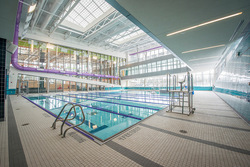
The Student Life Center was lauded for combining so many opportunities for users into one building. In addition to a vast array of physical recreation and fitness components, the Student Life Center also contains The Bistro, a state-of-the art residential dining facility that focuses on healthy, balanced eating, as well as Outdoor Pursuits, which provides a variety of outdoor recreation opportunities. Those opportunities include a Tripping Program that features hiking, camping, canoeing, kayaking and whitewater rafting trips; the Cortland Bike Project; the outdoor equipment rental program and the Adirondack Trailblazers Program. As one of two dedicated recreation facilities in the SUNY system — Stony Brook University’s Walter J. Hawrys Center is the other — the top priority for the Student Life Center is “Open Recreation,” which means that the facility is generally not scheduled for specific groups or special events and is available for recreational use by all students at all times. “This mode of operation is so important in providing consistent and viable recreational services for our students because they can always count on the facilities being available for them, which was not the case before the building opened,” Wright said. “In my opinion, our Student Life Center is the premiere recreational facility in the Northeast at this time,” Wright said. Wright notes that the Student Life Center’s offerings have grown since the building opened and will continue to expand in the years to come. There were 55 different group exercise classes per week open to users during the spring semester, ranging from indoor cycling programs to Zumba and cardio kickboxing. Meditation and Yoga classes are offered, as are cross training classes and massage therapy sessions. Personal trainers may be hired for $15 per one-hour session or through multi-session packages. Users may have their fitness level assessed by a trainer with equipment such as the BodPod. The Student Life Center’s amenities include:
The Student Life Center is also home to the College’s Outdoor Pursuits program, which leads regular trips for hiking, canoeing and camping. Outdoor Pursuits also offers workshops, manages an outdoor gear rental center and oversees both the Cortland Bike Project and the Adirondack Trailblazers Program. SUNY Cortland was named a Bicycle Friendly University by the League of American Bicyclists in 2017, thanks in part to the free bike checkout offered through the Bike Project. The growing Adirondack Trail Blazers program, which gives new students the chance to bond with classmates during an adventure at the William H. Parks Family Center for Environmental and Outdoor Education at Raquette Lake, attracted a total of 43 students in Summer 2017. More are expected to participate in years to come. 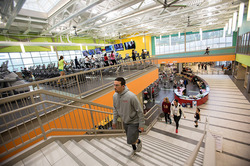
An athletic trainer will join the staff at the Student Life Center in time for the fall semester. The trainer will primarily support the 1,200 students who participate on SUNY Cortland’s 36 sport club teams, as well as users of the facility, in consulting and referring them to other medical professionals. Designed by Hastings+Chivetta and H2L2 Architects/Planners LLC, the Student Life Center is a major example of SUNY Cortland’s commitment to sustainability. It was constructed with Leadership in Energy and Environmental Design (LEED) certification (pending LEED Gold certification) through the U.S. Green Building Council. The building makes use of rooftop rain gardens and a portion of the College’s 3,600 solar panels. Large fans help move conditioned air throughout the entire space. Bioswales reduce the building’s potential impact on flooding and two underground water retention systems and permeable pavement help manage water runoff. With its massive variety of activities and gorgeous open concept design — including plenty of natural lighting — the Student Life Center has become the hub of the SUNY Cortland community. “It’s a wonderful thing to have the Student Life Center for our students and faculty and staff,” Wright said. “The facility is having a very significant and positive impact upon their health, fitness and wellness. It’s an attractive place and kids love to be here.” For more information, visit the Recreational Sports website or contact Wright at 607-753-5585. Brooks Named SUNY Cortland Women's Basketball CoachJacey Brooks has been selected as the new women's basketball head coach at SUNY Cortland in an announcement from director of athletics Mike Urtz. A former standout player at Buffalo State College, Brooks has worked with Division I coaching staffs for the past 11 years, most recently as an assistant coach for five years at Bowling Green State University in Ohio. Brooks takes over for long-time head coach Jeannette Mosher, who accepted the head coaching position at the University of Texas at Tyler last month. Lindsey Minor, an assistant coach the past three seasons, served briefly as interim head coach after Mosher's departure. "I would like to thank Mike Urtz, the search committee, and the College for this amazing opportunity," Brooks said. "During my playing days in the SUNYAC, I admired Cortland from afar. Once I became aware of the opportunity to guide such a successful program, so rich in tradition, history and resources, I instantly envisioned myself as the next head coach. "This is truly a dream come true and I am extremely excited and grateful to now lead this team. I am elated to come in and hit the ground running with a great group of young women. Coach Mosher did a fantastic job over the last 20 years and I look forward to keeping our sights on success!" 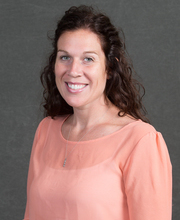
"We are excited to bring in a head coach with such vast experience at a very high level of women's collegiate basketball," said Urtz. "After learning of Jacey's work ethic and commitment to excellence, coupled with her extensive experience, we feel that we have really landed a top-level coach to lead our program going forward. I think the future looks bright for the Cortland women's basketball program." Brooks was part of a Bowling Green program that finished 30-5 overall, captured the Mid-American Conference (MAC) regular-season title with a 17-1 mark, and won three games in the Women's National Invitation Tournament (WNIT) in the 2013-14 season. She co-managed the Falcons' offensive scheme, including in-game decisions, from 2013-16 and served as the program's defensive coordinator and recruiting coordinator from 2016-18. The program had the fifth-highest team grade point average among Division I women's squads in 2014-15 and the seventh-best team GPA in 2016-17. In August 2015, Brooks was one of just 50 coaches across the nation selected to participate in the Women's Basketball Coaches Association's (WBCA) Center for Coaching Excellence's inaugural session for assistant coaches in Atlanta, Ga. She also attended the NCAA/National Association of Collegiate Women Athletics Administrators (NACWAA) Women's Leadership Symposium in Kansas City, Mo., in May 2016. Prior to her work at Bowling Green, Brooks spent three seasons on the coaching staff at Canisius College. She primarily worked with the team's backcourt players while assisting with the day-to-day operations of the program. Brooks also worked at St. Bonaventure University, where she moved into an assistant coach role for the 2009-10 season after spending two years as the director of basketball operations. The Bonnies finished 23-10 and made their second straight WNIT appearance in 2009-10. A native of Machias, N.Y., Brooks graduated from Buffalo State in 2006 with a Bachelor of Science in Health and Wellness. During her four seasons on the hardwood for the Bengals (2002-05 and 2006-07) she recorded 1,219 points and 554 rebounds, earned two All-SUNYAC honors, and helped lead the team to three straight conference tournaments. She currently ranks fifth in school history in scoring and 14th in rebounding. Brooks is also the Bengals' career free throw percentage leader (84.5 percent), and she holds the school single-season records for 3-point shooting percentage (43.4 percent in 2003-04) and free throw percentage (87.0 percent in 2004-05). Brooks has also coached in the Empire State Games, serving as an assistant coach for the Western region in the women's open division. She earned a Master of Science in Sport Administration from Canisius in May 2012. Adirondack Trail Blazers Program Invites Newest Red DragonsKaycie Haller thinks back to the summer before her freshman year at SUNY Cortland. She was both excited and nervous to arrive on campus, with two major questions weighing on her mind. “I remember thinking, ‘Am I going to be able to make friends? Will I have anyone to eat meals with once my mom and dad leave?’” said Haller, a senior adolescence education: history major from Wantagh, N.Y. The answer to both questions was yes, and a lot had to do with Adirondack Trail Blazers, a unique outdoor experience for new SUNY Cortland students. The program brings a small group of first-year and transfer students on a six-day trip to the College’s William H. Parks Family Center for Environmental and Outdoor Education in Raquette Lake, N.Y. 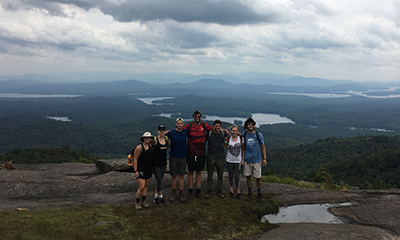
This year, the program takes place Saturday, Aug. 18, to Friday, Aug. 24. The overall goal is to build friendships and confidence in an outdoor setting before fall semester classes begin. Haller, who will serve as a trip leader this year, explained that participants are not expected to be rugged explorers of the outdoors. In fact, most students claim limited camping experience. The general expectations are simple: be open to meeting new people, trying new activities and learning more about the only National Historic Landmark in the SUNY system. “You might be intimidated when you hear backpacking in the Adirondacks,” said Haller, who joined Trail Blazers in 2015. “But I know people who had never been hiking and ended up becoming trip leaders with Outdoor Pursuits.” Reanna Zappavigna ’17, the graduate assistant for Outdoor Pursuits, is quick to provide answers to frequently asked questions about the program:
Participation numbers have increased each year since the program was launched in 2013, from eight students to 43 in 2017. Zappavigna attributes that to the growing sense of community created by Outdoor Pursuits and the willingness of today’s students to step outside of their comfort zones. “Being able to create your earliest college moments at Raquette Lake is special,” said Zappavigna, a former physical education major from Rome, N.Y., who is currently pursuing a master’s in teaching students with disabilities. “Meeting other new people in that setting gives you an extra boost when you’re back on campus — someone to go to the dining hall with, someone to join a club with, someone to be friends with down the road.” In the Adirondacks, smaller groups are made up of two trip leaders and approximately six new students representing all different academic majors. They are grouped as first-year or transfer students and they spend the majority of the week exploring the Adirondacks as a unit. They hike, paddle, camp and pass time by testing each other with riddles and word games. Access to technology and hot showers are limited, but both Zappavigna and Haller said a full day of activities make those luxuries easy to forget. “The entire experience is reassuring because you know that you’re all in this together,” Zappavigna said. An introductory dinner takes place at the Lynne Parks ’68 SUNY Cortland Alumni House on Saturday evening prior to the three-hour trip to Raquette Lake. And at the end of the trip, on Thursday night, Trail Blazers gather at a large bonfire to swap stories and experiences. Haller said it’s one of the trip’s major highlights. “No one wants to go to bed,” she said. “You realize you were part of this uniting experience and you’re coming back to campus knowing all of these different people.” The program invites participants to a welcome-back barbecue on campus, held at the end of the first week of classes as a way to check in and reconnect. Haller admits that she was mostly reserved and shy in high school, but she recalls arriving on campus after Adirondack Trail Blazers with a new sense of confidence. More specifically, she remembers bringing her first-year roommate to the barbecue and seeing a pick-up game of soccer being played nearby. “High-school Kaycie never would have played with them,” Haller said. “But fresh-out-of-Trail Blazers Kaycie asked to join their game, and the girl organizing it ended up becoming one of my best friends.” It’s a moment that revealed the value of her experience in the Adirondacks. “With Trail Blazers, you don’t come in with a lot of worries,” she said “You come in ready to enjoy college and make friends.” SUNY Honors Five Faculty and Staff MembersFive SUNY Cortland faculty and staff members received the prestigious State University of New York Chancellor’s Awards for Excellence during the 2018 Undergraduate Commencement ceremonies. The honorees, formally announced by the 64-campus SUNY system on Wednesday, June 20, are:
The SUNY Cortland honorees were among the 332 faculty and staff from across the university system who were named as recipients of the 2017-18 Chancellor’s Awards for Excellence. “Excellence is SUNY’s hallmark,” said Chancellor Kristina M. Johnson. “At each of our campuses it is driven by our faculty and staff and their commitment to providing the highest quality environment, where students are inspired and supported to excel as they pursue their passions.” SUNY Cortland President Erik J. Bitterbaum said, “I am always telling people how fortunate we are at SUNY Cortland to have such a talented and dedicated group of faculty and staff, and it is always gratifying when our deserving professionals are recognized. Each of these people have worked extremely hard and done so much to help the College’s students and its mission.” The Chancellor’s Awards provide system-wide recognition for consistently superior professional achievement and encourage the pursuit of excellence. Each campus president submits nominations, which are reviewed by the SUNY Committee on Awards. The awards are presented annually to faculty and staff in seven categories: faculty service, librarianship, professional service, scholarship and creative activities, teaching, adjunct in teaching and classified service. Kathleen Burke Burke, who joined the SUNY Cortland faculty as an assistant professor in 1999, has developed a highly successful student-centered approach to teaching. She offers academically rigorous courses that challenge students' thinking and stress the real-world application of economic principles to prepare them for careers in the field. 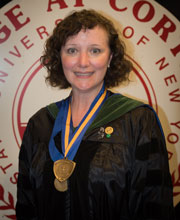
Burke teaches a variety of graduate and undergraduate courses. She firmly believes that every student has the ability to perform at a high level. She sets the bar accordingly and scaffolds students' learning. Her expectations are clear and fair. Student comments repeatedly praise Burke for her ability to instruct and connect with her classes. She developed The Community Innovation Lab, which combines an internship experience with the structure of a formal course as well as the unique opportunity for students to gain real-world business experience. Burke also has taught the First-Year Experience course, COR 101: The Cortland Experience, for the past 15 years. Her students often participate in the Volunteer Income Tax Assistance Program in Cortland County, providing hundreds of free tax service hours to low income level clients. Burke has a B.A. in economics and mathematics from William Smith College, and an M.A. and a Ph.D. in economics from Stony Brook University. A professor at SUNY Cortland since 2012, she has chaired the Economics Department since 2013. Burke is the 53rd SUNY Cortland faculty member honored by SUNY for teaching excellence. Michelle Congdon When Congdon perceives a need, she steps in to fill that gap with a demeanor that is always friendly, approachable and helpful. An employee in Human Resources since 1999 when she joined the College as a keyboard specialist, Congdon is the College’s 10th recipient of the award for excellence in classified service. 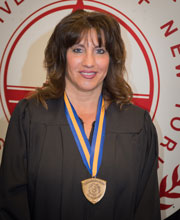
Promoted to her current role a year-and-a-half ago, she is highly respected for her communication skills and for her compassion. Congdon always strives to provide superior customer service, primarily because she genuinely cares about the welfare of others. Her expert attention to detail and ability to navigate the complex environment of health and other benefits translates to clear explanation and guidance for those who seek her help. A consummate professional and a role model for the campus, she demonstrates excellent problem-solving skills and flexibility as she manages the office effectively. Congdon provides extraordinary support to the current assistant vice president for human resources and has provided invaluable support to the affirmative action officer and to the benefits coordinator whenever needed. Outside her office responsibilities, Congdon served as chair of the Cortland Child Care Executive Board and as State Employee Federated Appeal (SEFA) chair for the campus. She plans and organizes the Classified Service Awards Ceremony each year and organizes division retreats and creative onboarding activities for new employees. She provided superb support for the SUNY Human Resources Association Conference. Andrew Fitz-Gibbon An authority on ethics, nonviolence and social justice, Fitz-Gibbon not only teaches, researches and writes his philosophical views, he lives them. A faculty member since 2005, he has personally applied his scholarly research on “loving nonviolent reparenting” to real life by providing foster care to more than 100 children who have experienced violence. He currently directs the Center for Ethics, Peace and Social Justice at SUNY Cortland. 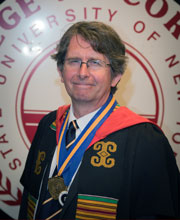
Fitz-Gibbon’s commitment to scholarship and community also extends to his work on the Cortland Regional Medical Center Biomedical Ethics Committee and the Cortland Regional Medical Center Ethics Review Committee. He is a member of the SUNY Faculty Senate Ethics Committee. At SUNY Cortland, Fitz-Gibbon has developed a highly successful Summer Ethics Institute for faculty and staff. The author of seven published books, Fitz-Gibbon has served as editor of Peace Studies Journal, as well as book series editor for the Brill/Rodopi Social Philosophy Series. Fitz-Gibbon has written numerous published articles and book chapters on nonviolence, including for the Routledge Handbook on Pacifism and Nonviolence. His 2016 book, Talking to Terrorists, Nonviolence and Counter-Terrorism: Lessons for Gaza from Northern Ireland, provides an analysis of the peace process in Northern Ireland and recommends several key lessons learned that might lead to peace in Israel/Palestine. Fitz-Gibbon twice was elected as president of Concerned Philosophers for Peace, North America’s largest group of professional philosophers focused on issues of war and peace. He also was elected as a Fellow of the Royal Society of Arts, the second oldest British Royal Society. A frequent presenter at national professional conferences, Fitz-Gibbon has a Ph.D. in social ethics from Newcastle University, England. He holds full Certification in Client Counseling from the American Association of Philosophical Practitioners. Fitz-Gibbon is the College’s 15th recipient of the system-wide award honoring scholarship and creative activities. Herbert Haines Haines, who is the 15th SUNY Cortland recipient to earn the system-wide faculty service honor, has provided extraordinary service to the campus, local community, region, state and national professional organizations. “Dr. Haines does not just ‘sit’ on a committee, he joins it, he acts on it, and he completes his assigned tasks,” one faculty colleague wrote. 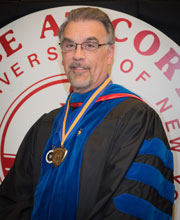
At SUNY Cortland, Haines has chaired or served on more than 38 departmental committees, College-wide committees, Faculty Senate, United University Professions, the SUNY Cortland Child Care Center and numerous departmental, campus-wide and presidential search committees. A member of the SUNY Cortland campus since 1985 who was promoted to professor in 1997, Haines earned a Ph.D. from University of Kansas, Lawrence Campus. His areas of specialization are crime policy, criminology, interpersonal and collective violence, social movements and social problems. A noted authority on the death penalty, Haines has made many presentations at regional and national conferences, as well as in classes at area colleges and universities. He has spoken on topics within his field regionally to Rotary Club, League of Women Voters, and American Association of University Women. He is a proposal reviewer on death penalty and medical marijuana related research for the National Endowment for the Humanities and the National Science Foundation. As member of several doctoral dissertation committees, Haines is a reviewer for tenure decisions at the University of Michigan-Flint and the University of Nevada, Las Vegas. A member of the executive board of the Midwest Sociological Society, he is a manuscript reviewer for Holt, Rinehart and Winston, Inc., Oxford University Press and Prentice Hall College Division. In the community, he has served on the board of Catholic Charities and was a member of the Cortland County Family Dependency Treatment Court Team. Lauren Stern An expert in both assessing operations quality as well as instruction, Stern is a highly innovative instructor who incorporates cutting-edge teaching strategies, including active learning and gamification, into her student sessions. The College’s sixth recipient of the award for excellence in librarianship, she joined the College in 2012. Stern has an M.S. in information science, school library concentration, from the University at Albany. 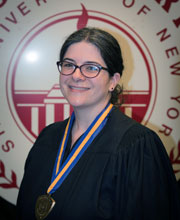
Promoted to librarian in 2014, she assumed responsibilities as interim information literacy/instruction coordinator. A dedicated leader on campus who is active on numerous committees, Stern was appointed as the permanent chair of the Research Help Steering Committee and has been instrumental in providing guidance for the improvement of library services. She is a frequent facilitator of staff discussions and training and has conducted extensive staff training on topics including modern library updates, assessment and information literacy. In addition, she serves as library liaison to several academic departments and programs on campus. Her College-wide committee work includes the General Education Committee, the Student Learning Outcomes Committee, the College Writing Committee and the Women's, Gender, and Sexuality Studies Committee. SUNY-wide, Stern has served for the past four years on the planning committee for the annual SUNY Conference on Instruction and Technology. Since coming to SUNY Cortland, she has authored a book chapter, several peer-reviewed essays and seven book reviews, a number of which appeared in CHOICE, a seminal journal for librarians. Stern also has presented at professional conferences in her field. Alumni Association Names Distinguished AlumniThe SUNY Cortland Alumni Association will present its most prestigious honor, the Distinguished Alumni Award, to three graduates during the Alumni Awards Luncheon during Reunion 2018 at noon on Saturday, July 14, in the Corey Union Function Room. That afternoon, the association also will present the inaugural Distinguished Educators Award to three honorees and recognize two young alumni, an Honorary Alumna and name its Outstanding Alumni Volunteer award winner. The 2018 award recipients are:
Since 1968, 129 SUNY Cortland graduates, including this year’s honorees, have received the Distinguished Alumni Award for their career accomplishments and outstanding service to their communities and alma mater. In addition, 26 alumni have been recognized with Distinguished Young Alumni awards, reserved for alumni who are younger than 35 years old and have graduated in the last 10 years. Since 1999, 16 alumni have been honored with Outstanding Alumni Volunteer awards. Nine individuals have been named Honorary Alumni. Here is a closer look at this year’s award winners: Distinguished Alumni Jim Benham ’67 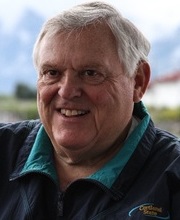
With a career in defense electronics and a patent in night-vision technology, Jim Benham ’67 is one of the original Silicon Valley pioneers. His expertise in photonics and high-power microwave devices has benefitted all branches of the U.S. military and major defense contractors. After graduating from SUNY Cortland with a bachelor’s degree in chemistry, Benham got his start as a research and development engineer at Raytheon. Following stops at ITT Electro-Optical Products and Varian Associations, Benham became president and CEO of Electro-Optical Systems in 1990. He currently serves on the Board of Directors for Intevac, Inc., which produces high-sensitivity sensors and magnetic disc films, and Richardson Electronics, which engineers products related to microwaves and imaging. Benham has successfully managed organizations that collected up to $300 million in annual revenue. Benham earned an MBA in industrial administration from Lynchburg (Va.) College in 1980. He completed executive development programs at Stanford University, the Wharton School of the University of Pennsylvania and Harvard Business School and continues to hold secret and special access clearances from the Department of Defense in support of his consulting duties. Near his home in the San Francisco Bay Area, Benham volunteers at the Open Heart Kitchen, the Pleasanton Senior Center and as a member of the board executive committee of the Tri-Valley branch of Sons in Retirement, a fraternal organization that provides for the welfare of retired men. Benham and his wife, Jane Sheehy Benham ’68, established the Benham Chemistry Scholarship at SUNY Cortland in the late 1990s. He visited campus for two days in 2015 as an Executive in Residence, meeting with chemistry, physics and economics majors and giving lectures on technology.
Megan Burns ’01 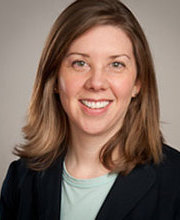
A lot of people complain about the nation’s health care system. Megan Burns ’01, is actually doing something about it. As senior consultant and Connecticut program director for Bailit Health Purchasing in Boston, Burns identifies policy recommendations for state lawmakers aimed at containing the costs of health care and ensuring affordability for all people in the state. It’s an ambitious job with potentially huge impact. And it all started with a pair of semester-long political internship programs Burns completed during her time as a SUNY Cortland student, working both in Washington, D.C., and with the New York state Assembly in Albany. “These early professional experiences were the foundation to my career and affirmed my desire to influence change through public policy,” Burns said. Burns earned a master’s degree in public policy from Duke University in 2005 and started her career at the Progressive Policy Institute in Washington, D.C., a think tank that describes itself as “radically pragmatic.” She then worked in hospital administration at the University of Pittsburgh Medical Center (UPMC), rising in the span of five years from administrative fellow to manager of ambulatory operations to senior director of business operations for inpatient rehabilitation. Burns volunteered for Pittsburgh Cares and served as a volunteer income tax preparer for the IRS during her time in Pittsburgh. She has since moved to the Boston, Mass., area and her current role for Bailit Health, a health care policy consulting firm, that works with public and private organizations to reduce healthcare cost and improve its quality. “My experience at SUNY Cortland continues to play a critical role in the success of my career, having given me the opportunity to pursue both professional and personal interests at a very early start,” she said.
Thomas Buschatzke ’77 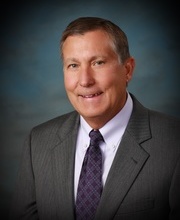
The challenge that faces Thomas Buschatzke ’77 every day as director of the Arizona Department of Water Resources can be summed up with a Benjamin Franklin quote. “When the well’s dry, we know the worth of water.” And in Arizona, the fourth driest state in America, that day could be just around the corner. Following a nearly two-decade drought and the driest winter ever, the Colorado River system is in trouble. The vital reservoir at Lake Mead is less than 40 percent full. And complicating potential solutions are a patchwork of water rights issues, agreements and unsettled disputes. Buschatzke, who holds a bachelor’s degree in geology from SUNY Cortland, is in charge of keeping the water flowing and setting the state on a path toward a sustainable water supply. Tapped by Arizona Gov. Doug Ducey in 2015, Buschatzke draw on more than three decades of experience in water resources. He worked for Arizona’s Department of Water Resources in the 1980s before becoming a hydrologist for the city of Phoenix and later the water resources manager for the City Manager’s Office. In 2011, he became assistant director for the Department of Water Resources’ Water Planning Division. Now, as director, Buschatzke administers and enforces Arizona’s groundwater and surface water rights and laws and explores methods of augmenting water supplies to meet future demands. Buschatzke is designated to represent the state in negotiating with the U.S. Secretary of the Interior, neighboring states and Mexico on issues regarding the management of the Colorado River. In September 2017, he was part of the delegation that amended the 1944 water treaty between the U.S. and Mexico. “My career is testament to finding collaborative solutions to thorny water management and allocation issues and ensuring that the City of Phoenix and the state of Arizona have a sustainable water future,” he said.
Distinguished Educators Fern Yasser Kupfer ’68 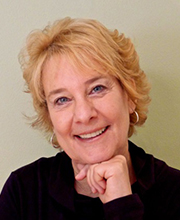
All people experience hardship. But it takes a unique talent to transform personal pain into literature that can share the lessons the author learned from navigating life’s struggles. Fern Yasser Kupfer ’68, an American author and retired associate professor of creative writing at Iowa State University, has written several novels and as well as two memoirs reflecting on her life experiences. Her first book, Before and After Zachariah, originally published in 1982, is a heart-wrenching reflection on her family's decision to institutionalize Kupfer’s severely disabled son, who was born with a rare genetic disease. The experience made her an advocate for parents of children with severe disabilities, which led to appearances on “Good Morning America” and “Oprah.” The book has had five editions published between 1982 and 1998 and has also been released in French. Her 2012 memoir, Leaving Long Island and Other Departures, includes her experiences of divorce after a long marriage, the challenges of raising a blended family from different faiths and cultures and the discovery that she carries the BRCA gene, which puts her at risk for breast cancer. Kupfer moved to Iowa in the early 1970s after having been a high school English teacher and working at a day care center in Rochester, N.Y. She received her master's degree in English from Iowa State University and taught creative writing there from 1988 until 2001. The Bronx native, who grew up on Long Island, has contributed regular columns to Newsday, and her work has appeared in publications that include The Washington Post, Redbook, Newsday, Parents Magazine, Cosmopolitan, Women’s Day and Family Circle.
Carolyn Macleod Long ’58 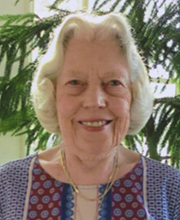
Retired teacher and school administrator Carolyn "Lyn" Macleod Long '58 literally had her day. After decades of achievement in education and community involvement in Chapin, S.C., which is similar in size to Cortland, Long was honored in 2015 when the mayor formally declared Nov. 3 "Lyn Long Day." Long, who has a doctorate from University of South Carolina, is a former South Carolina Distinguished Assistant Principal of the Year. She introduced new programs in reading and math at Chapin Elementary School that significantly increased test scores and attracted funding. Because of her focus on writing, the school was invited to highlight its successful writing program at three fall writing conferences and was inducted into the Exemplary Writing Hall of Fame, which is sponsored by the South Carolina Department of Education and governed by the Writing Improvement Coordinating Council. “Lyn saw herself as a cheerleader for teachers and always insisted that Chapin teachers were among the best in the business,” said her husband and nominator, Eugene Long. With the help of parents, teachers and students, Long initiated construction of a nature trail, including a wooden outdoor classroom behind Chapin Elementary. Lone Trail — Learning in an Outdoor Natural Environment — was spotlighted on PM Magazine on WIS Television. Since retiring, Long has coordinated an essay contest with Chapin-area elementary, middle and high schools to promote positive traits that lead to character development. She has written and illustrated several children’s books and reads at local elementary schools weekly. She organizes the Chapin Women’s Club’s annual day of service and was named Chapin Woman of the Year by the group in 2006. A lover of music and theater, Long sings, plays ukulele, taps and clogs with various groups in area retirement homes, churches and at community events.
Nestor Sherman ’84 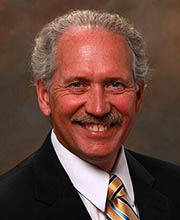
By any measurement, Nestor Sherman ’84, a Regents professor of kinesiology at Texas A&M University-Kingsville, is an accomplished academic. Of course few people are as qualified to measure that kind of thing as Sherman himself. Since 2002, Sherman has served on the faculty in the Health and Kinesiology Department at Texas A&M University-Kingsville, where he has developed a national reputation in the areas of measurement and research in exercise science. He was named to the 152,000-student Texas A&M University System’s Who’s Who and has been a Regents Professor of kinesiology since 2013. Sherman is the author or co-author of dozens of refereed journal articles on topics ranging from the accuracy of timers in the 40-yard dash to the validity of body-mass thresholds for obesity and from the impact of adventure activities on concentration to treadmill time standards for cardiac patients. He was named the 2007 Reviewer of the Year by Measurement in Physical Education and Exercise Science. Between 2008 and 2012 and again since 2014, Sherman has coordinated student enrollment in the department’s pre-physical therapy concentration. He served as interim chair of his department from 2004-05. From 2012 to 2014, he chaired the university’s Teacher and Bilingual Education Department. Sherman has received numerous university honors including the 2004 President’s Excellence in Service Award and the Taylor Dodson Young Professional Award from the Southern District of the American Alliance for Health, Physical Education, Recreation, and Dance (AAHPERD). Sherman is a fellow in the research consortium of AAHPERD as well as a fellow in the American College of Sports Medicine. He has a doctorate in physical education from University of Houston, Texas.
Distinguished Young Alumni Patrick Fannon ’13 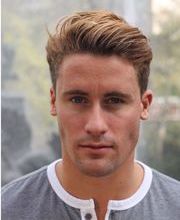
As a SUNY Cortland student-athlete, Patrick Fannon ’13 captained the cross country and indoor and outdoor track and field teams during his junior and senior years and was a three-time NCAA Cross Country National Championship qualifier and a 10-time member of the SUNYAC All-Conference Team. With that under his belt, Fannon decided to take what, to him, was the next logical step: Add two completely different sports to his running repertoire and try to compete in the Olympics as a triathlete. He came close. By 2015 his running, swimming and bicycle performance had reached a point where he was invited to train and compete at the U.S. Olympic Training Center in Colorado Springs, Colo. Ultimately, he didn’t qualify for the 2016 summer games in Rio de Janeiro, Brazil, but Fannon remains committed to his passion for athletics. He currently serves as the track and field coordinator at the Ocean Breeze Athletic Complex in Staten Island, N.Y. The 135,000-square-foot complex is operated by the New York City Department of Parks and Recreation and hosts various college, high school and community events. While transforming himself into a triathlete from 2013-15, Fannon worked as an assistant track and field coach for the University of Kentucky. He was an assistant coach and recruiting coordinator for the University of Massachusetts-Lowell’s track and field teams from 2015 to 2016. An exercise science major, Fannon is currently pursuing his master’s degree in sport management at SUNY Cortland.
Alexander Grimm ’10 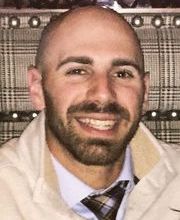
As a teacher and coach, Alexander Grimm ’10 has poured his heart and soul into the students and athletes he mentors at Sachem North High School in Ronkonkoma, N.Y. He’s such a popular figure in school that his students dressed up in his likeness — baseball cap, khakis, wraparound sunglasses and football headset — during the school’s Celebrity Day during Spirit Week. His younger sister, Brianna Clever ’17, wasn’t surprised. She remembers how discouraged she was when didn’t get in to SUNY Cortland during her senior year of high school. Grimm told her to keep her head up, motivated her to work hard and encouraged her to try again. After one year at SUNY Oneonta, Clever reapplied to Cortland and was accepted. “I received a picture from Alex of a large Cortland envelope with a text saying “Call me, I want to open it together,” Clever recalled. “Before he even read the first word of the letter, we were both in tears. I was so extremely proud of myself that I finally did it and was going to follow in my brother’s footsteps as a Red Dragon.” Grimm teaches global history, social issues and criminal justice. He coaches football and lacrosse and volunteers his time for various events such as the Out of the Darkness Walk to Prevent Suicide. Grimm, who earned a master’s in special education from St. Joseph’s College, began his teaching career working with children with autism.
Outstanding Alumni Volunteer William “Mike” Doughty Jr. ’69, C.A.S. ’92 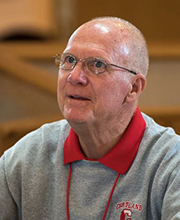
The word “doughty” can be defined by synonyms such as “stalwart,” “dedicated” and “undaunted.” In light of that, William Doughty Jr. ’69, C.A.S. ’92, or “Mike” as he likes to be called, certainly lives up to his name. That’s especially true when it comes to helping out his alma mater. On a recent morning, the retired Cortland High School principal was at the Lynne Parks ’68 SUNY Cortland Alumni House removing the lawn mower blades from the tractor so they could be sharpened. A day later, Doughty staffed the volunteer SUNY Cortland Alumni Association table in Old Main, directing visitors during “Transformations: A Student Research and Creativity Conference.” “I’d like to say it’s out of a sense of Cortland,” said Doughty, who also taught for many years in the McGraw Central Schools. “But I like to keep busy and do things. I like working with the Alumni Association. I got a lot from this community, and I love to give back.” He helps the Parks Alumni House staff set up or break down a major event, decorate for the holidays, scrape and repaint windows, shovel snow and lend a hand with gardening and spring cleaning. He assists with College events as well. “He’s just generally a great volunteer,” said Richard “Chick” Cecconi ’74, M ’89, C.A.S. ’93, another frequent alumnus volunteer. “Sometimes they call him and sometimes he just shows up and asks what to do.”
Honorary Alumna Robin Wheeler Baroni 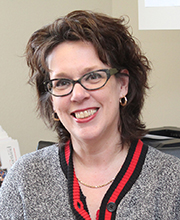
Robin Wheeler Baroni embodies the spirit of the Red Dragon family. As the Alumni Engagement team coordinator, she has been the friendly and warm person who has greeted attendees from the registration table at the last 18 alumni reunions. She has been the helpful individual working with members of the SUNY Cortland Alumni Association and taking notes at their quarterly board meetings. Wheeler Baroni was nominated as an honorary alumna by current association board member and former Student Government Association President Ronnie Genee ’03, a former intern in the alumni office. “There’s a very unique feeling that our alumni have for Cortland,” Wheeler Baroni said. “It’s home. It’s comfortable. It’s community. It’s friendship. And it’s love. And you have to always keep that close to you as well because if you don’t, then you can’t convey that to our alumni when you see them one-on-one, in groups.” Wheeler Baroni joined Alumni Engagement as a secretary in 1998 and immediately began taking on increasingly greater responsibilities. She was promoted to her current role several years later. Her father was Robert Wheeler, the late computing center director emeritus, and her childhood memories are steeped in College tradition. Her husband is Timothy Baroni, SUNY Cortland SUNY Distinguished Professor emeritus, biology, and a strong Alumni Association supporter. Wheeler Baroni retired in May. She learned about her honorary designation at her last Alumni Association board meeting. “At the last meeting, when they presented the award to me, I was overwhelmed,” Wheeler Baroni said. “I’ve been very fortunate.” So have the thousands of SUNY Cortland alumni who have engaged with Wheeler Baroni in an effort to deepen their connection with their alma mater. A genuinely compassionate person, she felt it was part of her job to do all she could to support alumni who were unhappy or disappointed. “It’s about keeping that old relationship alive,” she said. “It’s finding an old article or old photo and making a copy of it and sending it to them. Their whole life started here. It’s how you’d want to feel coming back to a place you grew up in.” Name Change for Communication and Media Studies DepartmentOver the last decade, SUNY Cortland’s Communications Studies Department has evolved to prepare students for promising careers in an ever-changing field; growing to support what has become one of the College’s most popular majors. Now its name will better reflect that focus. Starting July 1, the Communication Studies Department will be known as the Communication and Media Studies Department. As culture has developed new and innovative forms of communication in recent years, faculty in the department decided its name should more accurately reflect what they teach. “We’ve been looking at some curricular changes as well for the last decade,” said Professor and Department Chair Paul van der Veur. “There was a consensus within the department that the department name needed to be as inclusive as possible. There are a lot of things within the communication studies degree that are broader than the name implies. “It was our thinking that to make the name change would give prospective students and others a better sense of what we are all about.” The department currently offers majors in communication studies and new communication media. Communication studies focuses on understanding the role of communication in shaping culture and identity. The major includes concentrations in public relations and advertising, journalism and media production. New communication media offers students hands-on experience in developing digital video and audio content as well as animation and web development, providing avenues to a wide range of careers. A complete list of undergraduate courses is available online. The department added five new courses for the 2017-18 school year, ranging in topic from popular culture to advanced filmmaking to documentary production. These areas of study align more closely with “media” than “communication,” which was another reason for the department name change. The department also oversees student clubs such as The Dragon Chronicle, Cortland’s student newspaper; CSTV, the campus television station, and WSUC-FM, SUNY Cortland’s student-run radio station. Course offerings and majors are expected to grow in the future as the department continues to adapt and expand. “It’s an effort on the part of the department to meet the needs of a wider range of students than we were able to do in the past,” van der Veur said. “Already we’ve done that fairly well. Over the 15 years that I’ve been here, the department has grown from about 250 majors to almost 400.” For more information, visit the department online or call 607-753-4201. SUNY Cortland Athletics Golf Classic PlannedSUNY Cortland's annual Red and White Golf Classic will be held on Friday, July 13 at the Cortland Country Club. The captain and crew 18-hole tournament includes giveaways, lunch at the turn, golf cart, prizes, and a tee gift. The tournament will also feature a longest drive, closest to the pin and putting contests. Participation in this year’s tournament has sold out. To avoid selling out next year, the Athletics Department has reserved the Cortland Country Club for two shot gun starts next year. The 2019 tournament will be held from 8 a.m. to 1 p.m. on Friday, July 12. This year’s check in will begin at 9:30 a.m., with a shot gun start at 10:30 a.m. Proceeds from the tournament will support Cortland Athletics and the SUNY Cortland Alumni Association. For more information and to learn about sponsorship opportunities, contact Assistant Director of Athletics Jaclyn Lawrence. CALS Lecture Grant Applications AvailableCampus Artist and Lecture Series (CALS) Lecture Grant Applications are now available for the 2018-19 academic year. Applications are eligible for a maximum of $500 and are open to any club, program or department. These lecture grants will not cover performances of any kind. Applications must be received by Tuesday, Feb. 5, in order to be considered for February, March, April and May 2019 lecture programs. Applications received after this date may not be eligible for any spring semester funds remaining. For more information and to download the application, visit the CALS website, email Sandra Wohlleber or call 607-753-5769.  Suggest a feature story Suggest a feature story
Faculty/Staff ActivitiesTyler BradwayTyler Bradway, English Department, had his article, “Bad Reading: The Affective Relations of Queer Experimental Literature after AIDS,” published in the Duke University Press journal GLQ: A Journal of Lesbian and Gay Studies. The article appears as the lead essay in a special issue devoted to the study of LGBTQ literature. It is drawn from Bradway’s ongoing research into the ways that contemporary LGBTQ writers use experimental literary forms to imagine new modes of social and political community. Li JinLi Jin, Geology Department, co-authored a paper that was published in May in Science magazine titled “Late inception of a resiliently oxygenated upper ocean.” The multi-institution collaboration project with lead authors from Syracuse University is detailed in this news release. Will MontgomeryWill Montgomery, Communications Office, received the SUNY Council for University Advancement (SUNYCUAD) Award For Excellence for feature writing, honoring the job he did capturing the tale of SUNY Cortland’s 1980 national champion women’s soccer team and their subsequent documentary film and reunion. Read the story: “Film on First U.S. Women’s Soccer Champion – SUNY Cortland – Premieres.” The award was presented at SUNYCUAD’s annual conference held June 6 to 8 in Syracuse, N.Y.  Submit your faculty/staff activity Submit your faculty/staff activity
|
The Bulletin is produced by the Communications Office at SUNY Cortland and is published every other Tuesday during the academic year. Read more about The Bulletin. To submit items, email your information to [email protected]
© 2026 SUNY Cortland. all rights reserved.